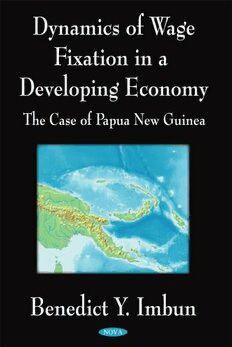Download Dynamics of Wage Fixation in a Developing Economy: The Case of Papua New Guinea PDF Free - Full Version
Download Dynamics of Wage Fixation in a Developing Economy: The Case of Papua New Guinea by Benedict Y. Imbun in PDF format completely FREE. No registration required, no payment needed. Get instant access to this valuable resource on PDFdrive.to!
About Dynamics of Wage Fixation in a Developing Economy: The Case of Papua New Guinea
This book is a microcosm of issues of minimum wage determination in developing countries examined in the context of Papua New Guinea (PNG). With provision of parallels, it discusses the critical issues, process, and actors involved in determination of minimum wage. Like most governments in developing countries obsessed with economic development, the critical issue for the PNG government has been to ensure that wage levels and the wage structure harmonise as far as possible with the national development aspirations and on the other hand, social objectives are maintained through the prevention of exploitation of workers. Although, the twin issues of economic efficiency and social equity have not been easily compatible, this book's testimony of experiences in accommodating the issues has been the most challenging for PNG. The challenges faced and lessons learnt in determining and regulating minimum wage would reflect similar experiences for many developing countries.
Detailed Information
| Author: | Benedict Y. Imbun |
|---|---|
| Publication Year: | 2008 |
| ISBN: | 9781608764150 |
| Pages: | 168 |
| Language: | English |
| File Size: | 0.68 |
| Format: | |
| Price: | FREE |
Safe & Secure Download - No registration required
Why Choose PDFdrive for Your Free Dynamics of Wage Fixation in a Developing Economy: The Case of Papua New Guinea Download?
- 100% Free: No hidden fees or subscriptions required for one book every day.
- No Registration: Immediate access is available without creating accounts for one book every day.
- Safe and Secure: Clean downloads without malware or viruses
- Multiple Formats: PDF, MOBI, Mpub,... optimized for all devices
- Educational Resource: Supporting knowledge sharing and learning
Frequently Asked Questions
Is it really free to download Dynamics of Wage Fixation in a Developing Economy: The Case of Papua New Guinea PDF?
Yes, on https://PDFdrive.to you can download Dynamics of Wage Fixation in a Developing Economy: The Case of Papua New Guinea by Benedict Y. Imbun completely free. We don't require any payment, subscription, or registration to access this PDF file. For 3 books every day.
How can I read Dynamics of Wage Fixation in a Developing Economy: The Case of Papua New Guinea on my mobile device?
After downloading Dynamics of Wage Fixation in a Developing Economy: The Case of Papua New Guinea PDF, you can open it with any PDF reader app on your phone or tablet. We recommend using Adobe Acrobat Reader, Apple Books, or Google Play Books for the best reading experience.
Is this the full version of Dynamics of Wage Fixation in a Developing Economy: The Case of Papua New Guinea?
Yes, this is the complete PDF version of Dynamics of Wage Fixation in a Developing Economy: The Case of Papua New Guinea by Benedict Y. Imbun. You will be able to read the entire content as in the printed version without missing any pages.
Is it legal to download Dynamics of Wage Fixation in a Developing Economy: The Case of Papua New Guinea PDF for free?
https://PDFdrive.to provides links to free educational resources available online. We do not store any files on our servers. Please be aware of copyright laws in your country before downloading.
The materials shared are intended for research, educational, and personal use in accordance with fair use principles.

